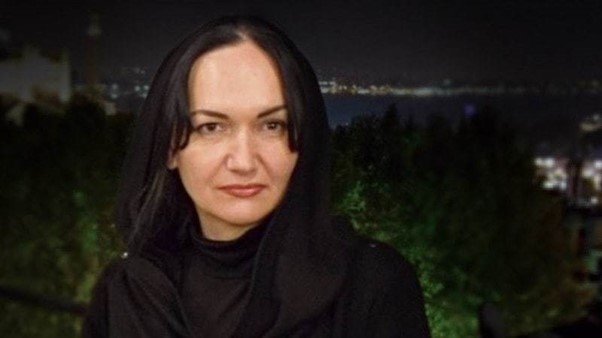Medical torture continues as Ukrainian journalist and human rights activist deported to Russian prison

“The pain will pass when you go deaf”. This was the only reaction that Ukrainian political prisoner Iryna Danilovich received when she informed the prison staff in Russia of the excruciating and escalating pain she was suffering. The prison staff had taken away the medication which her parents had obtained for her back in occupied Crimea and are refusing to provide the treatment she evidently requires. Such appalling treatment is yet further confirmation that Russia’s persecution of the 43-year-old nurse, human rights activist and civic journalist was always aimed at revenge for Iryna’s firm civic position and at silencing those who report violations of medical and other rights in occupied Crimea.
Iryna’s father, Bronislav Danilovych reported on 14 August that his daughter has been taken to prison colony No. 7 in Zelenokumsk (Stavropol krai, Russia). He has learned that she was placed in quarantine after being brought to the prison on 9 August, and that her medication was taken away. It was a supposed medical officer at the prison colony, Lidia Anatolievna Morozova who, instead of providing medical care, simply sneered at Iryna, who had complained of intensifying earache and headaches, and told her that the pain would pass when she became totally deaf.
As reported earlier, Russia has deprived the civic journalist of her freedom and is very likely to cause her to lose her hearing, at least in one ear, due to their refusal to treat a serious ear infection for around ten months. In March this year, she declared a dry hunger strike which she continued until the prison authorities promised a proper medical examination and treatment. The promise was not kept. Russia bears direct responsibility for Iryna’s life and health, and the journalist’s family and friends will be lodging a formal complaint over the failure to provide medical care. They also hope that Morozova will be added to those (mentioned below) who should be placed under international sanctions for Iryna Danilovych’s abduction, torture and persecution.
Danilovich knew all about political persecution in occupied Crimea, and regularly wrote for INzhir Media and the Crimean Process human rights initiative. She also headed the Crimean branch of the Alliance of Doctors trade union and had taken part in attempts to obtain the promised, yet never provided, pandemic-linked supplementary payments for medical workers. She spoke publicly, without concealing her identity, about the lies that the occupation authorities were telling about the real number of covid patients.
Under Russian occupation, such courageous behaviour immediately makes you a target of the Russian FSB. Danilovich was abducted by FSB officers on 29 April 2022 as she was waiting to catch a bus home following a night shift. She was held incommunicado, in some basement, for over a week before the FSB finally admitted, on 7 May to her detention. It was a further five days before her lawyer, Aider Azamatov, received confirmation that she was imprisoned in the Simferopol SIZO [remand prison]. The FSB charged her with carrying ‘an explosive substance’ in her glasses case a full week after her seizure and after numerous interrogations regarding supposed contacts with foreign organizations.
Since there was ample evidence that Danilovich had disappeared on 29 April, and she spoke openly in ‘court’ about the treatment she had received, the FSB claimed that she had ‘voluntarily’ remained in their basement, and was perfectly ‘comfortable’ in near-hotel conditions
Russia has been persecuting Crimean Tatar and other Ukrainian journalists and civic activists since its invasion and annexation of Crimea. It is possibly deliberate policy that the charges against Iryna were so evidently fabricated, as a lesson to other civic journalists of what they too can expect.
Iryna’s ‘trial’ took place before the occupation ‘Feodosia municipal court’ under ‘judge Natalia Kulinskaya from the Feodosia municipal ‘court’. On 28 December 2022, Kulinskaya ignored the huge weight of evidence against the FSB claims and handed down the seven-year sentence which had been demanded by ‘prosecutors’ Dmitry Lyashchenko and Yulia Matvyeya. She was also ordered to pay a 50 thousand rouble fine.
This sentence was effectively upheld on 29 June 2023 by the occupation ‘Crimean high court’. Presiding ‘judge’ Valeria Chernetska and her two colleagues only reduced the sentence by one month, to six years and 11 months.
Iryna’s release has been demanded by Ukrainian and international media and human rights NGOs. The EU and the UN Special Rapporteur on Human Rights Defenders have both demanded that Iryna receive proper medical care and have clearly stated that she is “unlawfully jailed” and that the sentence is “baseless”.
Please write to Iryna Danilovich!
The letters tell her that she is not forgotten, and Russia that its treatment of her is under scrutiny. Letters need to be in Russian, and on ‘safe’ subjects. If that is a problem, use the sample letter below (copying it by hand), perhaps adding a picture or photo. Do add a return address so that she can answer.
The address below can be written in either Russian or in English transcription.
357910 Российская Федерация, ул. Почтовая д.78, Ставропольский край, г. Зеленокумск, ИК-7 Зеленокумск
Данилович, Ирине Брониславовне, г.р. 1979
[Or in English:
357910 Russian Federation, Pochtovaya St, No. 78, Stavropol Krai, Zelenokumsk, Women’s Prison Colony No. 7
Danilovich, Iryna Bronislavovna, b. 1979 ]
Sample letter
Привет,
Желаю Вам здоровья, мужества и терпения, надеюсь на скорое освобождение. Простите, что мало пишу – мне трудно писать по-русски, но мы все о Вас помним.
[Hi. I wish you good health, courage and patience and hope that you will soon be released. I’m sorry that this letter is short – it’s hard for me to write in Russian., but you are not forgotten. ]





